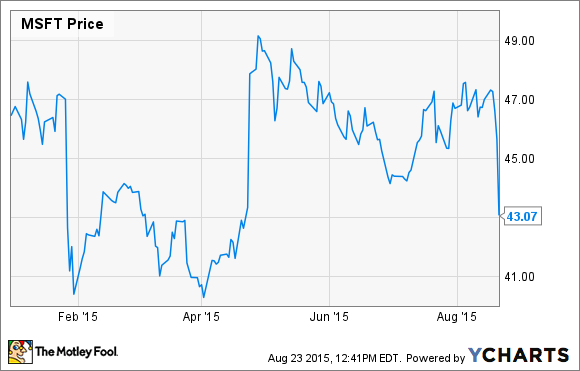Not long ago, it appeared that Microsoft (MSFT -1.32%) shareholders finally had something to cheer about. Following its strong fiscal 2015 Q3 earnings report on April 23, Microsoft stock shot up about 10%. Even more importantly, its impressive run continued, with the stock climbing toward its 52-week high, giving investors the sense that there was substance behind the good tidings.
Alas, Microsoft's stock has since given up its gains and is now down 7% year-to-date, lagging the industry.
Microsoft YTD Stock Performance, data by YCharts
For patient growth and income investors, however, Microsoft's recent malaise -- including the impact of its massive writedown last quarter -- is in part what makes it such an intriguing opportunity. As fans are well aware, CEO Satya Nadella's "mobile-first, cloud-first" transition is hardly complete. The two key strategic pillars are, however, making impressive strides.
Add in one of the industry's best dividend yields at 2.9%, and Microsoft's story becomes even more compelling. Microsoft is not alone, though -- for many of the same reasons, IBM (IBM -1.54%) also warrants inclusion in the discussion of tech's best growth and income stocks.
This could get good
The more than $8 billion in special charges related to writing down its devices unit grabbed investors' attention when Microsoft announced its fiscal 2015 Q4 earnings on July 21. And though it wasn't quite as significant, the end of Microsoft's streak of seven consecutive quarters of triple-digit cloud revenue growth didn't help.
However, it's worth taking a closer look at Microsoft's Q4 earnings. If not for the write-off, Microsoft would have posted earnings-per-share (EPS) of $0.62 last quarter, a 13% improvement year over year. And while cloud revenue growth didn't quite reach triple-digit territory, Microsoft still enjoyed an 88% jump. Its annual run-rate of over $8 billion in cloud revenue moves it to the head of the cloud class.
One important advantage of Microsoft's cloud sales growth is that it represents recurring revenue. It's also worth noting, as per COO Kevin Turner, that Microsoft's cloud unit now boasts 75,000 "partners."
As for Microsoft's much-maligned mobile efforts, there's some light at the end of that tunnel, too. Adapting its industry-leading software, including Office 365, for competing operating systems like Android and iOS will get Microsoft solutions in front of more consumers. As for hardware, the Surface Pro 3 and Surface 3 tablets are already performing admirably, with sales more than doubling last quarter to nearly $900 million in revenue.
And Microsoft's Surface results are about to get a major shot in the arm. According to Turner, the $888 million in Surface sales last quarter was driven in large part by Microsoft's 150 Surface resellers. Going forward, Microsoft will bump that figure to over 4,500 resellers around the globe -- continued growth is sure to follow.
Time will tell what impact the Windows 10 release will have on that declining area of the business, but with an estimated 53 million downloads in the first three weeks, it's safe to say that Microsoft is off to great start.
This sounds familiar
For many of the same reasons that Microsoft shares have slumped lately, IBM shareholders have had an even tougher year. The "what have you done for me lately" investor crowd doesn't appear interested in waiting around for CEO Ginni Rometty's "strategic imperatives" to drive growth.
It's their loss -- for IBM, the future consists of success in cloud sales, big data and the associated analytics it takes to utilize the full potential of the unprecedented reams of information available today. Yes, IBM's total revenue declined 13% last quarter thanks to a strong dollar, and EPS followed right along.
However, IBM performed admirably across its strategic imperatives, including a more than 50% jump in cloud sales. At an annual run-rate of $4.5 billion in cloud sales, IBM isn't quite in the same league as Microsoft, but it's already a significant player and becoming more so daily.
Though IBM doesn't break out revenue specifics for its Watson cognitive computing or big data units, business analytic sales also enjoyed a double-digit improvement last quarter. And at 3.5%, IBM pays an even higher dividend yield than Microsoft.
To be sure, both Microsoft and IBM offer growth and income investors intriguing alternatives. And over the long-haul, both are likely to reward patient investors. The distinction is that Microsoft is further along in its business transition, and if 88% growth in cloud sales is considered "slowing," investors can expect more stellar results where it counts in the future.





